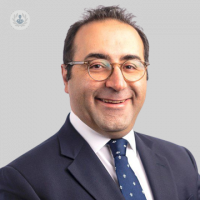Endoscopic pituitary surgery explained
Written by:In this article below, Mr Alireza Shoakazemi, a highly regarded consultant neurosurgeon, gives a detailed insight into all things endoscopic pituitary surgery.

How does endoscopic pituitary surgery differ from traditional surgical approaches?
Endoscopic pituitary surgery provides an ultimate visualisation and safety for surgical management of the tumours in the pituitary area. Using specially designed instruments, this technique will provide a more delicate removal of tumours and a better opportunity to preserve the function of important structures in this area. This technique, which has developed significantly over the years, has facilitated a more aggressive surgical management of certain brain tumours in this area.
What are the common reasons for undergoing endoscopic pituitary surgery?
This surgical approach is used to tackle different pathologies in the anterior part of the skull base, including tumours arising from pituitary gland, craniopharyngioma, other benign tumours such as meningioma, and certain malignant tumours.
What are the potential risks and complications associated with endoscopic pituitary surgery?
Although up-to-date technology is used for this procedure, this surgery does have associated risks. The main risk is leakage of the fluid of the brain and cerebrospinal fluid leakage. Spinal cord (CSF) is a highly avoidable risk. Experience in this specific surgical area can reduce the risk.
How long is the typical recovery period following endoscopic pituitary surgery?
Most patients make a full recovery after four weeks.
What outcomes can patients expect after undergoing endoscopic pituitary surgery in terms of symptom relief and long-term management?
This depends on why the patient had to go undergo this operation. Generally speaking though, patients can expect significant visual improvement and hormonal stability after this type of surgery.
If you wish to book an appointment with Mr Alireza Shoakazemi today, you can head on over to his Top Doctors profile to do just that.


